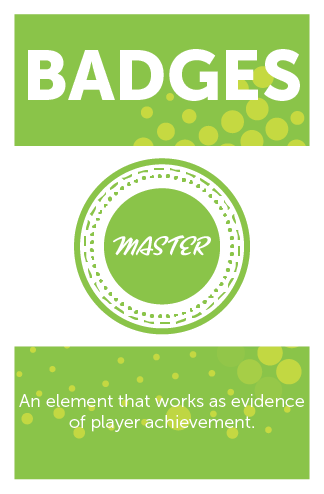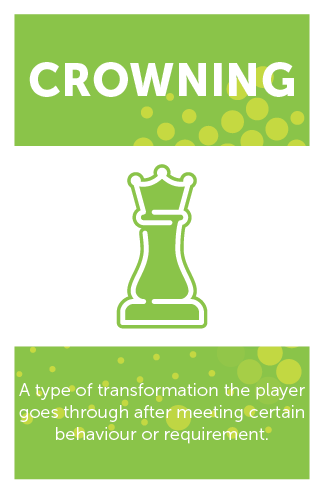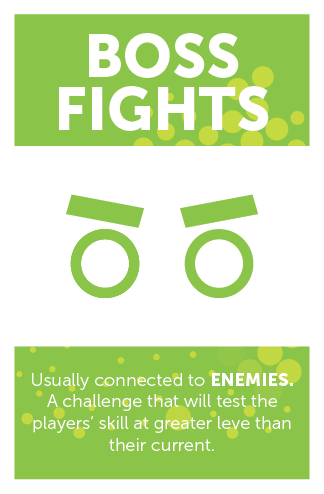Goal Category #gamemechanics
Defeat an enemy or get an item. Reaching the goal does not care about points.
It’s vrey different to win by points rather than goal. It’s not the same to say whoever crosses this line first wins instead of whoever gets this many points. However, the goal may be to reach X amount of points (like volleyball or tennis), in that case, you would be combining both mechanics.
Setting up goals is a very easy way for your players to know if they are moving forward. Sometimes gathering points won’t tell you much but, knowing that you got rid of this barrier and now can explore another city or unlocked a new floor in a building will give much more feedback.
ENEMIES are usually a VERY easy way of setting the WINSTATE of the system. You put a face to a big bad guy that players must defeat. The player level becomes totally unimportant, they will try to get as many abilities to defeat this guy and some might even try it with the lowest level to test their own skill and feel how far they are from achieving the goal.

The second element of the PBL tradition. Badges are E-V-I-D-E-N-C-E. This icons/patches/stickers/trophies/whatever-that-shows-evidence-of-accomplishment work as a simple way to know if you reached the goal or not.
The tricky part about badges is that unless they actually MEAN something emotionally worth to the players then they must not be issued. The badges will only become an obstacle or one more meaningles thing in the system like it happens with FOURSQUARE. Checking in a place and getting a BADGE just because you got there has ABSOLUTELY no meaning and are completely superficial.
Now, if you think about the BOY SCOUTS for a second, every patch they sew into their uniforms mean something. Whether it is they learned how to use a swiss knife, set up camp or setting up a fire with a single match. The meaning of the badge is so huge emotionally that it makes the player proud to wear them.

Yes, we might be stealing the concept from chess. Oh no wait, we are stealing it from chess, maybe checkers, whatever is older. The concept reffers to a transformation the player goes through after a lot of HARD WORK.
Think of pawns in chess… they are the weakest and must go ALL the way through the board to become a more powerful piece in the game. The work of the piece is rewarded that way and most likely, by crowning, the player CAN win the game (it’s not the goal but the concept is in the same neighbourhood)
Think of the hero who becomes king after defeating the great demon or the princess that becomes queen after saving the world or the clock that becomes a human being again after helping Beauty.
The achievement of the player is rewarded with the transformation of himself into something better. It’s not only a recognition of power but, an actual powerful growth from witihin.

BOSS FIGHTS do not have to be enemies or characters or figurines. They are challenges so hard to overcome players will use all their abilities and skills at each encounter.
The BOSS FIGHT consists of making sure the challenge the player is facing is at a different level and IT WILL BE HARD. The feeling you want to cause in the players is the feeling of “UUUFFF, we made it” or “AAAAHHH Almost made it”.
In gamification, retrying a challenge is a good option to offer the players a safe space for failure and growth. Usually, if the challenge is too complicated, like in a BOSS FIGHT, always consider the possibility to offer retries (like lives in Mario Bros)
Now, the hard part, DON’T MAKE IT IMPOSSIBLE. It’s easy to lose track of the ability you are tracking from your players.
Usually boss fights will challenge more than one ability and, if they come back often, they should challenge one [ability] at the beginning and then accumulate more on each further encounter.

Bernardo Letayf
M.B.O. (Mind Behind the Operation)
6th position in the Gamification Gurus Power 100!
Gamification Keynote Speaker & the mind behind the operation @bluerabbit, a gamification platform for education.
Developed three frameworks to teach/learn how to create gamification systems and build gamified content
Declared a world wide war on grades.
